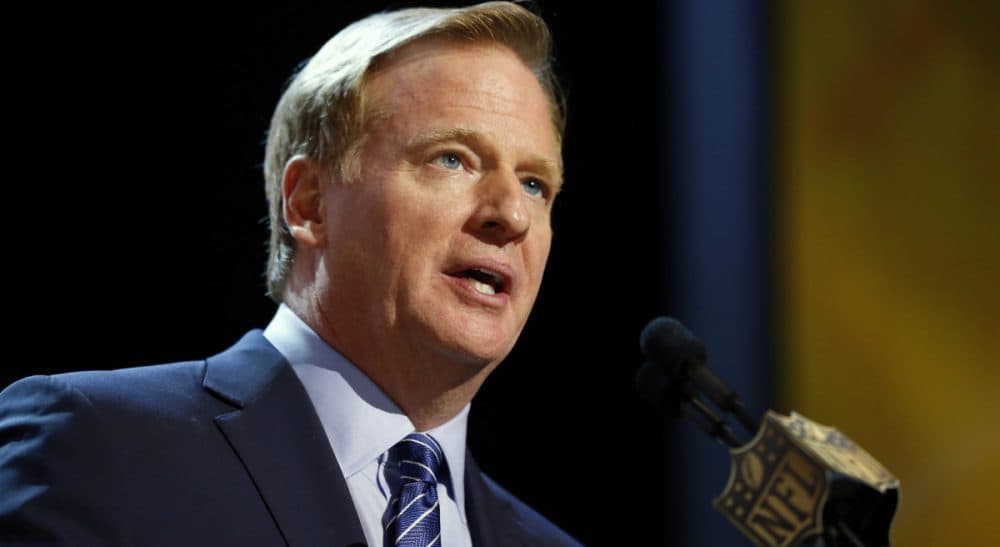Advertisement
A Failure Of Leadership: DeflateGate's Real Villain Is Roger Goodell

There was a time when DeflateGate was about the guilt or innocence of Tom Brady and the New England Patriots. But after his denial of Brady’s appeal of his four-game suspension, it’s now more about the actions and motives of the NFL’s $44 million-a-year commissioner, Roger Goodell, who is rapidly cementing his reputation as the worst commissioner in professional sports, and in NFL history.
DeflateGate is the molehill that Goodell turned into a mountain that now threatens to become a volcano if Brady and the NFL Players Association follow through on a threatened federal lawsuit. A Super Bowl has been won, an off-season come and gone, and NFL training camps for the 2015-16 season have opened, and yet the triviality of DeflateGate is as much a topic as it was six months ago.
DeflateGate is the molehill that Goodell turned into a mountain that now threatens to become a volcano...
Goodell could and should have ended it the day after the Jan. 15 Colts-Patriots playoff game with a $25,000 fine and a directive that game balls henceforth be provided by the league, not each team. Instead he commissioned the Wells Report.
He could and should have ended it after that report concluded it was “…more probable than not that Tom Brady was at least generally aware of the inappropriate activities of [the Patriots locker room and equipment managers] involving the release of air from Patriots game balls.” More probable than not? In 1941, the year Ted Williams batted .406, it was “more probable than not” Williams would make an out every time he stepped to the plate. On the roulette table, spin the wheel and it is “more probable than not” that the ball won’t land on black. “More probable than not” is not a conclusion. It’s a guess.
But Goodell embraced it, even after the Wells Report’s methodology was dismissed by the independent American Enterprise Institute as “deeply flawed.” He handed down a $1 million fine against the Patriots organization, took away two draft choices, and gave Brady a four-game suspension — twice the length of time he suspended Ray Rice for originally for cold-cocking his girlfriend in an elevator.
Brady, maintaining his innocence, appealed… an appeal that was heard by… Roger Goodell. He refused to recuse himself from the proceedings, no doubt stung by the track record he has accrued when independent arbitrators reviewed his rulings. Paul Tagliabue, Goodell’s predecessor, overturned four Goodell suspensions of New Orleans Saints players implicated in BountyGate in 2012. Last December, Judge Barbara Jones overturned Goodell’s indefinite suspension of Rice, saying the commissioner had, in effect, punished Rice twice for the same offense. And in February, Federal Judge David Doty overturned the indefinite suspension Goodell gave Adrian Peterson for child abuse.
Advertisement
Why? Because he was making this stuff up as he went along. In 2012, Goodell appeared on the cover of Time magazine above the headline: "The Enforcer." He clearly loved the moniker. Why else would he now choose to drag the name and reputation of one of the NFL’s all-time greatest players through the mud over such an inconsequential incident?
Yes, inconsequential. In the first half of the Colts-Patriots playoff game on Jan. 15, which started the folly, Brady, playing with underinflated balls, was a middling 11-for-22 for 92 yards (an average of 4.18 yards per play), one TD and one interception. In the second half, playing with properly inflated balls, Brady was 12-for-14, 134 yards, (an average of 9.57 yards per play), two TDS and no interceptions. If Goodell really wanted to punish the Patriots and Brady, he should have forced the team to play with under-inflated footballs in the Super Bowl.
In denying Brady’s appeal Wednesday, Goodell made much of the fact that the quarterback had destroyed his cellphone instead of turning it over to Ted Wells and his team of investigators. But isn’t it just as reasonable to assume there were non-football related information or photographs on the phone that Brady had a right to keep private? Say you were married to a Brazilian supermodel. Isn’t it possible, even probable, you would have private photos of your wife that you would not want Ted Wells’ team to have access to? Instead of handing over the phone, according Goodell’s 20-page decision denying the appeal, Brady and his agents “offered to hand over a spreadsheet that would identify all of the individuals with whom Mr. Brady had exchanged text messages during [the relevant time] period; the agents suggested that the League could contact those individuals and request production of any relevant text messages that they retained.”
Having proceeded down this destructive path, Goodell has left the NFL open to years of litigation and untold millions in liability for disparaging the character of one of his league’s most marketable players. No one wins.
Goodell declined the offer, saying that retrieving the details of Brady’s cellphone records was “simply not practical.” He then proceeded to justify the length of the four-game suspension by equating being generally aware of the deflation of a football to using steroids. “The closest parallel of which I am aware is the collectively bargained disciplined imposed for a first violation of the policy governing performance enhancing drugs,” Goodell opined.
That comparison is a tough one to swallow. Anabolic steroids acquired and used without prescription is in violation of both state and federal law. Letting some air out of a football is not a crime. More importantly, the use of steroids has been proven to lead to elevated levels of testosterone, which can lead to violent behavior off the field and on, which can lead to incidence of domestic violence, of which the NFL has had more than its share under Goodell’s watch. Deflating a football is literally child’s play compared to the use of performance enhancing drugs. Goodell, of all people, should know better.
Having proceeded down this destructive path, Goodell has left the NFL open to years of litigation and untold millions in liability for disparaging the character of one of his league’s most marketable players. No one wins. I would call that a failure of leadership. For $44 million, the NFL can and should do better.
